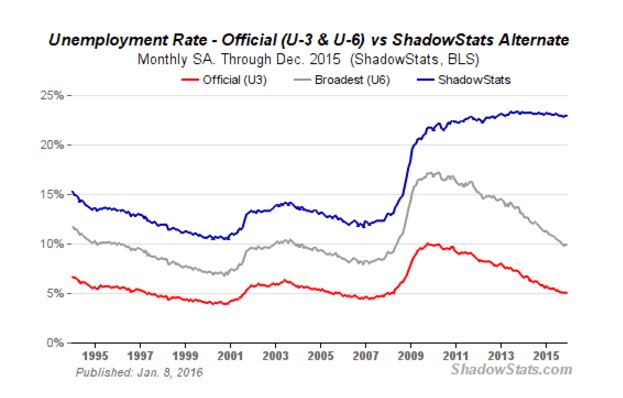Is this economic recovery real? Well if you base your observations on how far the Dow has risen since the financial crisis of 2008-2009 and on the B.S statistics the BLS puts out, the answer would be a yes. However, if you do just a little cursory digging, you will spot that this economic recovery is nothing but a grand illusion. The following factors clearly prove that this recovery is not real.
Copper
A leading indicator is in a death spiral so all must not be well. It is trading at multi-year low. If the economic recovery were real copper would be trending upwards.
The Baltic Dry Index
Another leading indicator appears to be locked in a race to the bottom with the copper, this is another index that should be trending upwards and not at multi-year lows.
Unemployment figures
The data the BLS puts out does not give you a real picture of what is going on. According to the BLS, the unemployment rate is roughly 5%. Shadow statistics, on the other hand, states that as of Dec 2015, the unemployment rate stands at 22.9%

Wage stagnation
Real wages have been declining since 2000. In fact, $22.41 today has the same purchasing power an hourly salary of $4.03 cents hand in 1973.
Student debt
Student debt is a time bomb waiting to explode. It stands at $1.3 trillion and is growing roughly at a rate of $2,800 every second. As of June 2015, 11.5% of the debt was delinquent for at least 90 days according to Bloomberg. 40 million American now are carrying some form of student loans. 70% of college students graduate with debt, and there is no guarantee of landing a job upon graduation. The department of education has stated that the by 2025 this debt is set to surge to almost$2.5 trillion. A massive default here will make the financial crisis of 2008 appear to be a walk in the park.
We are creating new debt at a mind-boggling rate
This issue needs no explanation; our debt will soon hit the $19 trillion mark, and there appears to be no end in sight. The U.S is never going to be able to repay this debt back. And should interest rates ever move higher, it could have a hard time making payments on this huge amount of debt. Even if rates remain low, at some point debt payments are going to start to hurt. Our debt has soared from below $ 1 trillion in the 80’s to almost $19 trillion currently, it is projected to soar to $30 trillion by 2026.











Leave A Comment